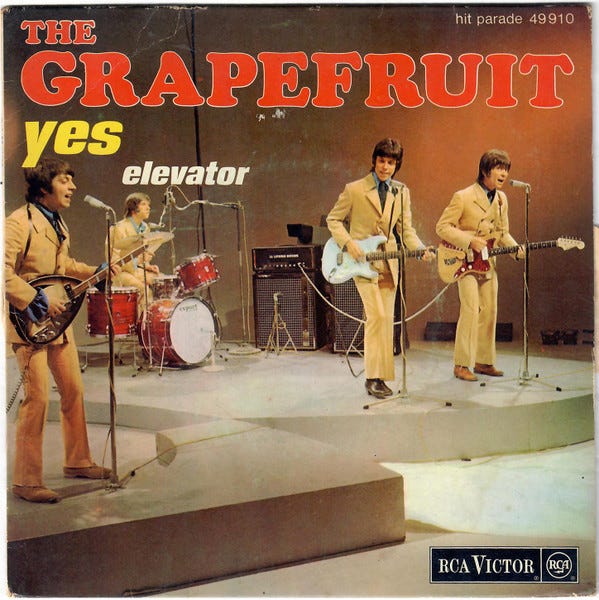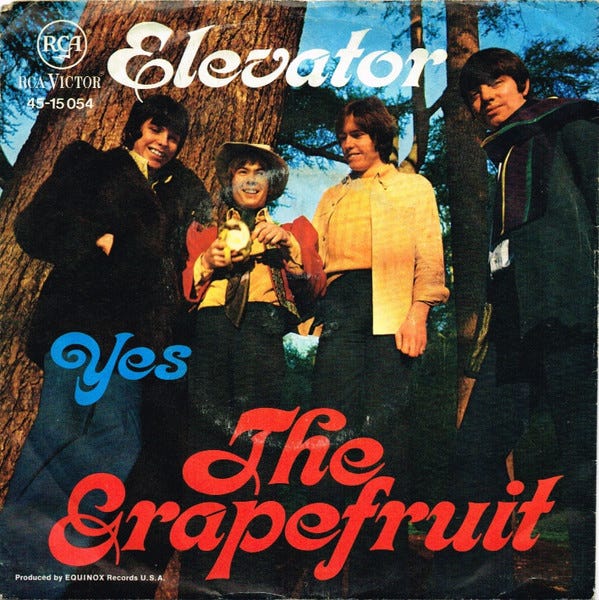Grapefruit Juice
A double blast of joy and optimism from one of my favorite 1960s singles
Life, as I think most of us have realized by now, has the potential to provide us with an endless array of things to feel sad, angry, bitter, depressed or generally bummed out about. Just this week, we lost two heroes of mine — actor/comedian Joe Flaherty and activist/musical sage John Sinclair — and Old Man Winter, under the misguided impression that we’ve really enjoyed his dreary company for the past several months, decided to favor us here in the Northeast with an extended engagement that no one actually asked for.
All of this was enough to take the pep in my step and slow it down to a beleaguered trudge, and that’s without even factoring in the horrific crimes against humanity happening in Gaza and elsewhere, a certain former president getting disgustingly preferential treatment in certain courts of law, and the general reinforcement just about everywhere I look that profits will almost always take precedence over the well-being of the general populace or our planet itself.
There were times in the past where I’ve felt totally paralyzed and deflated by similar developments, especially when they’re combined with tumult in my personal life or frustration over lack of writing work. Happily, neither of the latter two factors are currently coming into play; I’ve been involved in a blissful and totally positive romance for nearly a year now, I’ve been enjoying steady work again for months now, and there are some interesting and exciting writing projects currently doing the “come and get us” dance in front of me.
But even back in times when I lacked such things to keep me focused and feeling appreciated, I realized that I could either give in to the ceaseless onslaught of darkness and negativity, or I could revel in the hints of cosmic magic that every day also brings. A snuggle from a cat, a peep from a bird outside my window, a laugh with a good friend, an unexpected burst of sunshine coming through the trees — these are the kinds of things that keep me going through the darkest of times, and give me the strength to push back at the encroaching horror.
And then, of course, there’s music.
A couple of years back, during a particularly bleak period in my life, I bought a handful of singles from a seller on Discogs. One of them was a US 45 of “Elevator,” a 1968 single by Grapefruit that I hadn’t realized existed until I found it in this particular seller’s “store”.
I’d loved “Elevator” — with its Who-like opening chords, giddy rush of melody, and efficient way of accomplishing everything it needed to do in just over two minutes — since first hearing it decades ago on the band’s Around Grapefruit album, but had no idea it had ever actually been released as a single in the US. As it was only four bucks, and the other items I was purchasing were already qualifying me for free shipping, I didn’t think twice about tossing it into my cart.
Grapefruit — or The Grapefruit, as they were originally called, before it became unhip among 1960s groovers to have a “The” prefacing your band name — were an uneven but interesting British band, and (at least to the best of my knowledge) the only musical entity that can boast direct connections to The Beatles, Yoko Ono, Terry Melcher and AC/DC.
The band was formed in late 1967 by George Alexander, John Perry, and brothers Pete and Geoff Swettenham at the behest of Apple Publishing director Terry Doran. Born Alexander Young, Alexander was an older brother of Easybeats guitarist/songwriter George Young and future AC/DC guitarists and co-founders Malcolm and Angus Young; already a working musician when the Youngs’ parents decided to emigrate from Scotland for a better life in Australia, Alexander chose to stay behind in the UK to pursue his career.
Impressed by Alexander’s songs, Doran signed him to a deal with Apple Publishing, Ltd. in the fall of 1967, making him one of the first non-Beatles on the newly-launched music publishing company’s roster. John Perry (not to be confused with the Only Ones guitarist of the same name) had also pitched some songs to Apple; but while Doran wasn’t particularly impressed with them, he encouraged Perry and the Swettenham boys to put a band together with Alexander.
The Beatles themselves quickly took an interest in the new group. John Lennon named them after Yoko Ono’s book Grapefruit, and — having fallen particularly hard for Alexander’s “Lullaby” — he and Paul McCartney took them into London’s Advision Sound Studios in January 1968 to record the song. Since Apple the record label had yet to launch, the company’s publishing wing licensed the band to RCA in the UK and Equinox in the US; the latter, a new subsidiary of Dunhill Records, had recently been established by Byrds/Paul Revere & The Raiders producer Terry Melcher.
The band’s first single, the Melcher-produced harmony pop number “Dear Delilah,” peaked at #21 in the UK charts in the spring of 1968, and the Lennon-McCartney-produced “Lullaby” was mooted as the followup. But when RCA had trouble locating the song’s master tapes — The Beatles were off in Rishikesh with the Maharishi, and couldn’t be reached — the Alexander-penned “Elevator” was released as the next single instead. On the flip was the Perry-penned “Yes”. Though reportedly intended as a “double A-side,” both sides flopped dismally despite their high quality.
“Yes” was also included on Around Grapefruit, the band’s debut album, but for some reason it never made much of an impression on me in that context. But when the package of Discogs singles arrived, and I heard the song after giving “Elevator” its initial spin, I was completely blown away by it. The sound was spritely yet confident and forceful, reminding me a lot of the Swedish band Tages (especially their 1968 b-side “Like a Woman”); its vocal harmonies were filled with palpable joy and and its lyrics with unabashed positivity. After all, what could be more positive than the word “Yes”?
“Elevator” has plenty of positivity of its own surging through its two minutes and five seconds, though the song is pretty obviously a metaphor for the benefits of psychedelic exploration, which (to paraphrase Grandpa Simpson) was the style at the time. “Yes” could certainly be interpreted the same way (“You never realize what happens in your mind/But see the infinite and leave all that behind”), but the sense of epiphany that echoes through lines like “Yes! It’s happened to me. Yes! At last I can see. Yes! Tonight I am me” feels more like the sort of spiritual and/or psychological breakthrough that can be obtained through meditation, a good therapy session or an awe-inspiring encounter with the beauty of nature. While spinning this single on that day two years or so ago didn’t immediately trigger that kind of epiphany for me, it did give my spirits a much-needed lift, no pun intended.
I ran across the “Elevator”/”Yes” single again the other day while filing some recent purchases, and immediately felt compelled to pull it out and play it. Both songs got me smiling and sent my heartbeat joyfully racing, but that line “Tonight I am me” really hit me deeply. Because over the past few months, as I’ve felt the accumulated darkness of the past several years really begin to fall away, I’ve come to realize how much of my true self I’d unintentionally submerged or simply set aside as I attempted to save my struggling marriage and right my struggling career. And while I suppose I could be feeling some pain and anger about having done that, I’m really just overjoyed to truly be feeling like myself again.
Yes, at last I can see. Yes, tonight I am me.
\




Transcendence through music.....can't beat it! My finding this article "in my bin" is much like, I'm guessing, your original finding of the single on Discogs (I'm going to imagine you rifling through used-record-store bins in the '70s)!!
First, never heard of Grapefruit, and your revealing their story is one of astoundingly bizarre connections! At that late-'60s time, I sense "the biz" was large, yes, but also still small to the point of our gaped jaws at all those soon-to-be-accomplished folks getting together was so "everyday" at the time! And, they were all trundling on new turf themselves!
When I first laid eyes on the domestic label (on the YT video...and, before I started reading), I just figured Grapefruit had to be an American band, likely psych or garage, and probably from SF! As for Equinox, I didn't recognize the label graphics, so I didn't snap to THAT Equinox being Melcher's Equinox, which I later became intimately familiar with in the early- and mid-'70s!
Probably through articles and reviews in early-'70s (I was 18 in '73) Phonograph Record Magazine (PRM), Greg's BOMP!, and possibly CREEM, I had discovered Melcher's new label....by this time, now distributed by RCA with a vastly different Equinox logo. All I knew, at the time, was that every time RCA released an Equinox imprint, I had to get it! Terry was all about signing and recording Beach Boy-adjacent artists.....Bruce Johnston, Legendary Masked Surfers, and just other really cool and must-have records (that, of course, radio never played)! In fact, even finding them would usually send me to "rack jobbers" or holes-in-the-wall outfits that sold singles in bulk to club owners to fill their juke boxes! These places had stacks of 25-count gray boxes holding same-title singles. Most record collectors of the day, never really knew these places as a possible source of finding new and fascinating singles you'd not find at standard record stores, and maybe not even the promos in local (Houston, in my case) regional sales offices of a CBS or Warner Bros. (and, I checked)!
It felt weird going into these places (that sold to club owners, etc, for juke boxes), 'cause all I was doing was shopping for 1 copy of this single and that (never really knowing if I'd ever find anything I'd want....but, if I saw the Equinox logo, instant buy, no question! This became true of other labels and names, like Thom Bell, Gamble & Huff....see it? Buy it! The pay-off for rabid liner-note reading!!), and not several boxes of the same title! I felt naughty!!🤣
I'd love to find a full discography, now, of all the RCA/Equinox releases! I had a bunch, but I'm sure a lot of singles fell thru the cracks!
Anyway, Dan, thanks for sending me down an Equinox rabbit hole, introducing me to a band, by all rights, I should've been all over, if not in their late '60s heyday, then certainly back in my '70s record-hunting days! They're fun, evocative songs, no doubt, and I'm happy to hear they've helped right your psychic ship of late!🎶👍
Never heard of Grapefruit. So good. Thanks for enlightening me with a new group to get into.